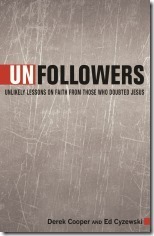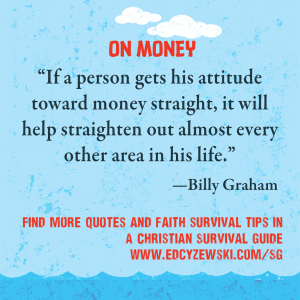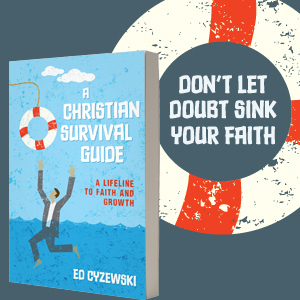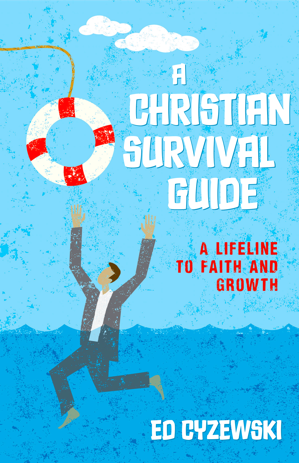Ed Cyzewski's Blog, page 32
August 8, 2014
3 Things I Don’t Want to Admit About Money
If you asked me, “Do you have a money problem?” there’s a good chance I’d reply, “Yeah, I don’t have enough.”
Any chance you can relate?
While I could solve a few problems with more money, “not having enough money” most likely isn’t the main problem we have with money.
Money is the kind of topic that some churches talk about all of the time, others never talk about, and a few only talk about as a last resort before going broke. There’s a good chance that many of the Christians who don’t talk about money fear they’ll accidentally sound like a church that talks about money all of the time.
Money gives Christians fits because we all need it, but we all know it’s like a ticking time bomb—a really, really nice looking ticking time bomb that we all want to own. In fact, we worry that money will expose us to evil.
In 1 Timothy 6:10, Paul wrote “the love of money is a root of all kinds of evil.” If we’re listening to Jesus, he makes money look pretty bad. In the Gospels, the parable of a rich man and a poor man named Lazarus provides a cautionary tale about the snare of money. The rich young man chose his wealth over Jesus, but Jesus also made the startling request to sell everything he owned. The power of money to distract us or to even take over our lives is clear. In fact, Jesus even went so far as saying that the poor are blessed.
Money can be a real threat to our faith, causing us to make terrible decisions and threatening our faithfulness, but we still need it to pay the rent, to buy necessities, and, at least during the winter, buy hockey tickets. How should
1. Money Is Often Neutral
Having said all of that, it’s clear that money isn’t necessarily inherently evil. Rather, it can lead to trouble. Remember, Paul said that the “love of money” is the problem.
If it’s a ticking time bomb, it’s also a time bomb that we can continually disarm. Let’s remember that Jesus was supported by a group of wealthy women. The early church in Acts pooled their resources together to support one another, yet it’s clear that plenty of Christians owned homes in order to host meetings. There’s no doubt that Priscilla and Aquila had financial means because of their trade as tentmakers.
While having a lot of money can be a big problem (as in a loaded up camel passing through the eye of a needle), it’s not necessarily a roadblock to faith. Learning to be generous with money can be a tremendous source of joy.
However, tons of problems arise when I start relying on money.
2. Money Replaces God
I know that I often fear not having enough money, but should I perhaps spend more time fearing too much money? Should I worry that I’m always worried about not having enough money?
I often tell myself that having a little more money would solve many of our problems and take care of most of the sources of our stress. I rarely consider how a little more of God’s kingdom could actually provide a far better resolution to my worries. There is a peace and contentment that comes from the pursuit of God (1 Tim. 6:6) and treasures that do not rust or decay. Most days, if I’m really honest, it takes a lot of faith to believe that. It’s no wonder that money can be such a faith wrecker.
Money, in many ways, can be used to address the very same things that God wants to deal with in our hearts. I certainly need reliable financial provision, but I often want to cut God out of the equation when asking for that provision. Rather than viewing God as my provider and his kingdom as my ultimate goal, I make money into my god, trusting it to provide the security I crave. Money becomes my god that provides comfort.
Money can wreck our faith or at least provide some really problematic distractions. While we can use it well and should never create a once-and-for-all template for how to handle money, failing to discuss it provides room for money to take over.
3. The Best Way to Manage Money Is to Give It Away
We used to live near a very affluent town in Vermont. It was a popular vacation spot for people who made big bucks in New York City—a place where some people thought nothing of plunking down $500 or more a night for a hotel room. It was the only town where I could find a job—naturally in the tourism sector.
Here’s the thing about money: it starts to change your values. It changes how you think.
In fact, the more money you have, the more companies will try to trick you into frivolous spending. David Cain writes,
“Here in the West, a lifestyle of unnecessary spending has been deliberately cultivated and nurtured in the public by big business. Companies in all kinds of industries have a huge stake in the public’s penchant to be careless with their money. They will seek to encourage the public’s habit of casual or non-essential spending whenever they can.”
I was surrounded by this lifestyle. I was also extremely conscientious of how I dressed, the beat up station wagon I drove around, and how I carried myself. It’s hard to cut yourself off from the influence of money and the kind of mindset it creates.
I was always thinking of new ways to spend money on our home rather than saving money or giving it to worthy causes. That felt perfectly normal, as our home didn’t quite measure up to the many homes around us.
In retrospect, I can see the value in leaving that area. It would have been far healthier and helpful to be more proactive in donating most of the money that I wanted to spend on myself.
How do you fight a culture obsessed with consumption? Try generosity.
We consume because we think it brings happiness. However, generosity has reminded me that there’s another kind of joy that is far more long-lasting available.
When we’re not consumed with the love of money or treating money like a deity we can carry in our wallets, it’s helpful to remember that we can actually use money to get happiness. However, we can only unlock happiness if we give our beloved deity away…
What have you learned about managing money?
This post was adapted from A Christian Survival Guide.


August 6, 2014
What If a Newspaper Reviewed the Book of Revelation?
Oh, hey, did you hear that another Left Behind movie is coming out in October? It’s sure to make the book of Revelation extra, super scary. Check out this official description:
“The most important event in the history of mankind is happening right now. In the blink of an eye, the biblical Rapture strikes the world. Millions of people disappear without a trace. All that remains are their clothes and belongings, and in an instant, terror and chaos spread around the world. The vanishings cause unmanned vehicles to crash and burn. Planes fall from the sky. Emergency forces everywhere are devastated. Gridlock, riots and looting overrun the cities. There is no one to help or provide answers. In a moment, the entire planet is plunged into darkness.”
Death! Destruction! Chaos! Terror! End Times Judgment!
AWESOME!
Man, Revelation sounds terrifying… that is, if such events linked to an actual rapture were actually going to happen.
I’ve already shared quite a bit about the book of Revelation in my book The Good News of Revelation. That book digs into the background of Revelation, particularly its audience.
The short version is that John wrote a book in a series of symbols in order to answer a very important question: Why are God’s people killed and oppressed by the Romans if Jesus is Lord?
As evidenced from the movie promotion, the Left Behind version of Revelation can turn God into a violent and angry monster hell bent on destroying the world—or at least the people who weren’t raptured. When I worked on A Christian Survival Guide I found that such violent depictions of God can become a huge barrier to faith.
How do we reconcile Jesus, who said, “My peace I leave with you” and a God who is about to send fire pouring down on the earth?
Well, there are lots of ways we could go about this. We could even look at the Bible, but sometimes a little bit of humor can help cut the tension.
Why not write up a fake book review of Revelation to snap us out of Left Behind terror?
Book Review from the Ephesus Exposé
“Sophomore Effort from Fisherman Casts Wide Net in Revelation by John of Patmos”
Dragons, beasts rising from the sea, and angel guides add elements of danger and mystery to the latest release from John of Patmos, even if they sometimes fall flat as familiar, pedantic tropes from Jewish “apocalypticisms” and the wildly speculative book of Daniel. John is clearly reacting to the stinging critiques of his previous eponymous release that used painfully simple Koine Greek and dragged over-wrought symbols and signs through each scene. If his microcosm of a “gospel” was too reductive, obvious, and heavy handed, his apocalypse veers toward the obscure and obstreperous with its grandiose literary aspirations and pantheon of religious symbols.
For all that is familiar and overused in Revelation, it’s a coruscating and provocative read that offers a new-age twist from John’s break-off Jewish sect of Nazarenes that reenacts a series of familiar, though sometimes tiring, biblical clichés such as the serpent vs. the woman and the plagues that precede the exodus. His opening epistolary warnings to a series of churches lends an air of urgency that drives home the many symbols of heavenly and earthly warfare that follow. No doubt his readers may puzzle over the identity of the Antichrist, but once again, John’s failure to develop this character only serves to expose his limitations as an author. For all of his faux sophistication, John of Patmos remains hooked on his humble origins and has yet to produce a work of literature that will endure beyond its two-week release period. Fascinating though John’s innovations may be, this humble laborer’s work still smells fishy.
- Flavius Josephus
Read more ridiculous parodies in A Christian Survival Guide—because everyone struggling to save their faith needs a good laugh, right?


August 5, 2014
5 Signs You Don’t Have an Abusive, Megalomaniacal Pastor
A few years ago I was meeting with my pastor, and friend, to talk about communication because our church had almost shut down. Things needed to change… fast. He’d been the teaching pastor while the “Lead” pastor ran things into the ground. My friend’s honesty and focus in the middle of the crisis were refreshing.
Several ongoing church events/ministries were struggling to continue, and he took a very frank, people-focused approach:
“If we have enough people willing to make them happen, that’s great. If not, we’ll put those things on hold to make sure we can do a few things well. Right now we need to focus on communicating better and helping everyone navigate this season of transition.”
In case you aren’t familiar with how churches can work sometimes…
He didn’t fall for the temptation of putting ministries above people.
He didn’t focus on how it would make him look to have a ministry end.
He also focused on the particular season of the people in our church: a lot of people were hurting, and he knew that he needed to focus on helping them.
You don’t have to look too far these days to see what a terrible pastor looks like. Perhaps you’ve been under the authority of a terrible pastor for so long that you’ve forgotten what a good one looks like.
While I’ve had a few crazy pastors over the years, I’ve been blessed with quite a few good pastors and teams of pastors, men and women, young and old, who modeled all that is good about pastoral ministry. Having chosen to not go into full time ministry myself because I felt like I didn’t have the right skill set for it, I have taken note over the years about what makes a good pastor:
Your Pastor Has Accountability
Congregational churches typically have a mishmash of elders and congregational accountability that is manifested through votes. Other churches function with a hierarchy of elders and/or bishops who provide oversight and accountability.
Both models (and their many variations) have strengths and weaknesses. The key is that pastors shouldn’t be able to stack the deck in their favor. They need people who can speak with bracing honesty into their lives for their own health and for the health of their congregations. If a pastor has overstepped his/her authority at any point, members of the congregation need a reliable place to go to share their concerns.
Your Pastor Delegates Responsibility
The best pastors I’ve worked with over the years gave away their power by empowering others and letting fellow pastors or lay leaders make important decisions or lead critical groups or ministries. Pastors who try to control too much inevitably burn out.
Interestingly enough, Jesus delegated a ton to his disciples before they even understood what kind of Messiah he would be—if some believed he was the Messiah at all. His disciples were empowered to baptize, cast out demons, preach, and heal.
Narcissistic pastors will be the most defensive and possibly abusive since they will try to protect their positions and public perception about them by concentrating as much power as possible.
Your Pastor Communicates
I grew up in a church where the pastors effectively used the bulletin, website, and church events to communicate. They moved intentionally slow in order to keep everyone on the same page.
I don’t think communication is the same thing as building consensus, although it can help build consensus. Communication should at the very least inform members about a process or expected change so that they aren’t surprised by a dramatic change on Sunday morning.
Part of belonging to a community is communicating in order to keep everyone in the loop. Taking an analogy from a family, it’s a pretty terrible idea to spring a move to another city or even a nearby house on the kids without telling them that you’re looking at houses or considering buying a new house, etc. The kids don’t get to decide where you’re going to live, but they should know about the process before you tell them to start loading the moving van.
Your Pastor Leads Relationally, Not Positionally
The best pastors I’ve seen over the years lead through lunches, breakfasts, and coffee meet ups. They host meals where leaders and groups gather together for discussions. They listen and share what they’re thinking.
They get things done, but sometimes it takes a little bit of time to launch a new small group or ministry, especially if the people involved are new. They need time to build up a relationship.
I’ve read stories about pastors who demand obedience because of their positions that are allegedly based on biblical authority. These pastors are the bullies who make demands as authorities rather than asking for help as members of the same church family who are guided by the same Spirit.
Your Pastor Is Not Key to Your Church’s Success or “Brand”
If people talk about your church, are they talking about the kinds of things your church does or do they inevitably talk about your pastor? While some pastors are naturally more interesting and popular than others because of their preaching style, I’d be worried about attending a church where the pastor is the main highlight rather than the actual ministries of the church.
There are lots of bad reasons to attend a church, and a rock star pastor is among the worst because it’s not sustainable and could breed a really unhealthy atmosphere that is more centered around entertainment and making fans rather than community outreach and making disciples.
What are some other marks of a good pastor?
Read more about the ways bad churches happen to good people in my new book:
A Christian Survival Guide: A Lifeline to Faith and Growth.


August 4, 2014
Songs That Saved My Faith
I’m the ultimate late adopter for pretty much every kind of music there is. Don’t believe me?
In college I finally started getting into this little known band called U2.
So it shouldn’t shock anyone to learn that I was lukewarm if not ambivalent about Rich Mullins during the same season of my life. As a freshman in college, I couldn’t quite relate to everyone who was devastated by the news of his death. It was a terrible tragedy for sure. I just didn’t have all that much invested in the guy.
About a year later, the Ragamuffin band that used to tour with Rich visited my university. I attended the concert because there wasn’t much else going on at our college in the middle of the Indiana corn and soybean fields. I didn’t realize that concert would play such a pivotal role in saving my faith.
I’m not one to raise his hands during worship. You won’t find me dancing in the aisles. I’m probably more likely to roll my eyes during worship than to lift my eyes up to heaven.
But something about those songs took me out of myself. It was a pure, wonderful moment of seeing God with eyes wide open and arms outstretched. The opening riffs of My Deliverer had me out of my seat and singing along.
By the time they played “All the Way to Kingdom Come,” tears streamed down my eyes. I could hardly sing the words as I wept about the love and mercy of God.
Those songs have stuck with me. They have a power unlike any other music for me, always lifting me to this other place where I can see the love of Jesus and mercy of the Father with unmatched clarity.
I mean, how can I choose which lines to quote from All the Way to Kingdom Come?
“We didn’t know what love was ’til He came
And He gave love a face and He gave love a name
And He gave love away like the sky gives the rain and sun
We were looking for heroes, He came looking for the lost
We were searching for glory, and He showed us a cross
Now we know what love is ’cause He loves us”
That says it all for me. It’s like an instant invitation to worship.
While I’ve written a bit more on the intellectual and theological levels with my Christian Survival Guide book, worship songs and the emotions these sometimes lead to can be just as powerful for the health and stability of our faith.
We serve an emotional God who felt like a jilted lover, prayed passionately while on earth, and wept over the fate of Jerusalem. We should expect to meet God with both what we think and what we feel.
As a way of balancing out my approach in the Christian Survival Guide, I’ve started creating a Playlist on Spotify called Songs That Saved My Faith.
I’m inviting you to join me by adding the songs that have helped save your faith. Some of my friends have already dropped in their favorite songs.
Just click below to start adding your own songs to the playlist:
I pray that this playlist will help you connect with God on a deeper level, especially when you find that words fail you and mystery surrounds you.


August 1, 2014
We Don’t Need Church INC, But We Need Community
I used to really overthink what church should and should not do.
Having swung all over the map on church meetings, I’ve realized that anything from candlelit high liturgy to a group of friends gathering in a living room can serve just fine as a church. In fact, I’m grateful that we have so many different ways to worship God in community. That can actually be a tremendous asset for us because we can seek out the places where we can find life—sensing the deep, healing breath of the Holy Spirit as we gather together.
Healthy Christian community is an essential, but not because skipping church is a sin. The command from the author of Hebrews to not give up gathering together (Heb. 10:25) hardly demands the formation of a nonprofit organization that constructs a building, hires a pastor, and holds a morning and evening service every Sunday with a worship band and a sermon. The author of Hebrews was thinking of the life that comes when we worship God together (most likely with a celebration of the Lord’s Supper), encourage one another, and hold one another accountable—the details are wonderfully sparse.
Here’s what we need from Christian community:
We need to confess our sins to real people.
We need friends to pray for us.
We need to be challenged to get off our couches and serve our communities.
Everything about Christian growth is very specific and personal, and there is no better way to draw near to God than with the support of a community.
Sometimes we turn Christian fellowship into an all-or-nothing matter where you’re either fully involved in a church and its “discipleship system” of Church INC or you need to abstain from it fully. We need process more than we realize, but that process doesn’t have to be a discipleship program with study guides and graduation certificates.
Throughout the Gospels, we see the disciples and especially the apostles as people who are immersed in a process with Jesus. They frequently missed the point of his stories and failed to step out in faith at crucial moments. We don’t ever read of Jesus saying, “That’s it! You’re all fired. I’m getting a new group of apostles.”
Perhaps we imagine Jesus audibly sighing or needing to step away to skim rocks along the Sea of Galilee, but he stuck with his apostles right through Pentecost when he shared his Spirit with them. If it takes us some time to figure out a healthy and life-giving form of church, I think Jesus can stick with us.
From the perspective of American Christianity, there is a strong expectation that good Christians go to an official church service. For everyone who feels like the church has let them down or has caused more problems, these expectations can be suffocating. Sometimes we feel like our only option is escape, and for those who attempt an escape, the condemnation that follows may serve as justification for fleeing a supposedly sinking ship.
When it comes to church, we have so many options available to us. I have seen friends who felt liturgy too constricting and therefore joined a network of house churches. Other friends found that liturgy provided a wonderful order for their worship as an alternative to the three-hymns-and-punt approach in their former churches.
There come times when we need to suck it up and join a community where we can find strong relationships despite other trappings that are less appealing. However, if a particular church becomes difficult to attend, it’s not like Christians today lack options. God’s Spirit is alive and working in many places, even among small groups that simply meet together for prayer and encouragement.
We need community, but we don’t need that community to come wrapped up in the trappings of Church INC. We need the support of our Christian family to help us stay focused on God and to pick us up when we fall down. That is something sleeping in on Sunday morning can’t do.
This post was adapted from my new book
A Christian Survival Guide: A Lifeline for Faith and Growth.


July 30, 2014
Why Don’t Protestants Talk about Dark Nights of the Soul
Have you ever felt like there are times when prayer doesn’t work, or God seems distant?
In my own Protestant tradition there isn’t a whole lot written about the times we fail to find God or struggle with doubts. In fact, our focus on being saved or unsaved may even create a dynamic where we see faith as a switch that’s either on or off, and if things aren’t working, we fear that somehow we’ve lost our salvation or God isn’t real after all. We don’t have much of a grid for seasons of struggle, depression, and loneliness. Some have been told that God is either real and capable of showing up when we pray or God’s fake and will not show up when we pray, but there’s a third option. God can be both real and not present for a season.
I won’t even begin to speculate about the potential causes for a dark night of the soul. However, I want you to know that you’re in good company if you’re going through one. In her personal letters, Mother Teresa wrote about living in a perpetual season where she didn’t hear from God. She persevered in faith as she served the poor even if she couldn’t get a direct confirmation from God for long stretches of time.
A Saint Living in Darkness
Mother Teresa set out to serve the poor after having several mystical encounters with Jesus in 1946. She wrote in those days about her encounters with “the Voice” who asked her to serve the poorest of the poor and about her passionate love for Jesus. However, once she began serving the poor in Calcutta, she entered a prolonged season of spiritual darkness and loneliness:
In a letter estimated to be from 1961, Teresa wrote: “Darkness is such that I really do not see—neither with my mind nor with my reason—the place of God in my soul is blank—There is no God in me—when the pain of longing is so great—I just long & long for God. . . . The torture and pain I can’t explain.”
I have sensed the joy of the Lord when I do certain things. I’m well aware of God’s guidance for specific things in my life. However, there are many days when I don’t get a clear sense of God’s direction. Some days are lonelier than others when I pray. I’m stuck with persevering by faith based on what God showed me.
Some traditions see this season of alienation and darkness as a bad thing. It certainly can be that. I don’t think anyone should feel alienated from God . However, these situations are not without precedent. We’re in good company if we have a season of darkness or emptiness. If we’re always praying for spiritual breakthroughs and come up empty, we need to stop and ask what God is teaching us in this season of loneliness and silence.
Sometimes a time of waiting and anticipation can be just the thing we need even if it’s not what we want. Oftentimes the seasons of my greatest needs, doubts, and struggles have made me more reliant on God than any other and have strengthened my faith in ways that I never anticipated.
That isn’t to say that we should crave a dark night of the soul or downplay how difficult one can be. Rather, we fail to see that God can even use these seasons for good. All is not lost if God seems distant.
Today’s post was adapted from the chapter on prayer from A Christian Survival Guide: A Lifeline to Faith and Growth.
Sources:
Daniel Trotta, “Letters Reveal Mother Teresa’s Doubt about Faith,” Reuters, http://in.reuters.com/article/2007/08/24/idINIndia-29140020070824 (accessed July 31, 2013).
July 29, 2014
Why I Avoided Christians Who Lost Their Faith
This week I’m sharing a story from my Christian Survival Guide book about the time I avoided a man who was a former Christian:
From the post…
I had a lot of reasons to hate Clark.
We were polar opposites in every way. I’m a driven, self-starter who would rather die than break the rules. He was the atypical slacker who did the bare minimum to get by, letting others, namely me, do the heavy lifting for him. He’d chat up anyone near his office, and when company proved hard to find, he’d wander the building in search of anyone willing to kill a half hour with him.
When I didn’t cover for his deficiencies, Clark snapped that I’d better do my job.
I stormed away, swearing just loud enough for a co-worker to hear me.
Clark brought out the worst in me, and I let it happen rather than seeking to understand him or at least have a frank conversation about our differences. Over the years, we maintained an uneasy truce with our parallel careers within a small business of no more than ten employees.
At a company event, we happened to end up sitting next to each other. Seeking any kind of conversation topic, I asked him about his family who lived a few hours away. He mentioned that they were Christians, and he couldn’t stand the people at their church.
No surprise there. I was sure they felt the same way about him.
Clark went on to share that he had, in fact, been a Bible study leader and church elder before leaving the faith. I can’t tell you what we talked about after that. I just remember being shocked and then suddenly quite afraid.
Clark had a significant amount of Bible knowledge. He’d been taught everything that I knew. For some reason it stopped working for him.
Why? Why did he leave the faith? Honestly, I didn’t want to know.
Seeing Clark as a fallen Christian suddenly opened my eyes to my own hypocrisy. I had failed him greatly by hating him for his work habits. And when I learned that he had left the faith, I only wanted to write him off all the more. I didn’t want to wrestle with any of the questions or issues that wrecked his faith.
Fearing the fate of my fragile faith, I distanced myself from doubters like Clark.
Isn’t that something we’re all tempted to do when we meet someone who has left the faith?
Read the rest at A Deeper Story.


July 27, 2014
She Had Every Reason to Stop Believing: On Faith That Survives
That night I met a young woman at an inner city church dramatically changed the way I think about faith and doubt. She had huge misgivings and questions about God and the Bible. She felt like the church hadn’t been a friendly place to deal with them. She’d even been spiritually abused by leaders who used the Bible as a weapon.
She had every reason in the world to walk away from her faith. Yet, she held on, served among the poor, and kept showing up each Sunday. The more we talked, the more I wanted to tell her that there are some reasonable explanations for her doubts. She didn’t have to continue on with her faith hanging on by a thread.
Couldn’t there be a place to honestly think through the tough questions we face? Can’t we do better?
I started thinking through the topics that she found troubling and then moved on to the topics that have been threats to my own faith over the years. It’s been a good five years of thinking, questioning, and even doubting. The product of that season of inquiry is my new book, A Christian Survival Guide: A Lifeline to Faith and Growth.
A Christian Survival Guide is on sale today wherever books are sold, and as part of the book release festivities this week, the publishers of my other books are also offering some steep eBook discounts, including two full length books for $2.99 each. Scroll down for the full list of discounted eBooks…
DISCOUNTED EBOOK DETAILS: A Christian Survival Guide is available in print or as an eBook, with the eBook priced at $9.99. The Good News of Revelation and Hazardous (a book about making the risky decisions that result from following Jesus), are both $2.99 at Amazon. Unfollowers should be $4.99 at my publisher’s website, but due to a glitch the discount isn’t live yet. Stop by this week for the updated price or stay tuned on social media for updates.
Publisher’s Weekly shared about A Christian Survival Guide:
“Cyzewski approaches each topic with candor, sharing stories that make it easy to relate to the topic at hand. While many of the topics are complex, he provides a point of entry into each and raises thoughtful questions about how much importance Christians can assign to aspects of the discussion.”
After you’re done reading A Christian Survival Guide, I’d love for you to share what you think in a brief review.
Thanks so much for reading!

The Good News of Revelation
$2.99 on Amazon

Hazardous: Committing to the Cost of Following Jesus
$2.99 on Amazon
Purchase from the publisher.

Unfollowers: Unlikely Lessons on Faith from the Doubters of Jesus

Purchase from the publisher for $4.99.

A Christian Survival Guide
$9.99 on Amazon
Learn More Here…
Purchase from the publisher.
Note: All Amazon links are affiliate links.


July 21, 2014
Where Was God Last Week?
Let’s not mince words here. There were quite a few moments last week where a direct intervention by God would have been really timely:
Israeli bombs falling on children playing soccer on the beach in Gaza, to say nothing of the homes being demolished and the civilians who are losing their lives in the current conflict.
A civilian airliner was shot down over Ukraine.
Children from Central America are fleeing gang violence and rape, seeking refuge across the U.S. border.
Not to mention the communities in Africa struggling to find clean drinking water and viable farm land, human trafficking that’s destroying lives throughout Southeast Asia, and the civil war sweeping through Iraq.
Where is God right now?
When I wrote about this particular issue for my Christian Survival Guide, I had other tragedies in mind. However, we don’t have to look long before we find particular moments that punch us in the gut and leave us speechless. Perhaps one of these events from last week did that to you. I know they did that to me.
As I wrestled with these events and the place of God, I confess that I can’t line up certain ways of reading the Bible with what I’m observing. I can’t say that God is predestines every event according to a precise plan.
Also, throughout scripture, God routinely offers people choices, saying their actions will determine what kind of future they have.
I would rather have no God than a God who mysteriously orchestrates the death of children for a higher purpose.
I know that some people join me in that assessment, while others can handle that tension better (I only use the word tension to be charitable to their perspective). I also admit that my point of view doesn’t resolve every question or problem. Nevertheless, we are left with these pressing questions:
What should we make of a God who doesn’t always deliver us from evil?
Where is God when great acts of evil are unleashed in our world?
It’s not enough to say that Jesus bore evil on the cross. That’s a good starting point, but it comes up empty from my perspective. Yes, he didn’t fight back. Yes, he bore evil and defeated it by rising again. There is some comfort in that, but it doesn’t resolve the role of God right now. What is God actually doing about the problem of evil in our world?
I don’t think I can resolve this in a single blog post. And even my chapter on God and the problem of evil in A Christian Survival Guide is more of an overview, but let me offer a direction to explore.
What if part of the resolution to the problem of evil is Pentecost?
There is a trajectory throughout scripture of God desiring to dwell among his people, of renewing their hearts and minds, and even guiding them. “God among us” strikes me as the goal throughout the Old Testament prophets. When Jesus came, he wasn’t setting up a one-time, God among us event that ended with the cross and resurrection. He was leading us to something bigger: Pentecost.
The point on which everything in the ministry of Jesus turns for me is Pentecost. The cross and resurrection established God’s take on suffering—suffering alongside us, overcoming evil with resurrection. However, the power of God was released into our world through Pentecost.
Pentecost establishes God’s new way of interacting with our world—his Spirit working through us. Jesus reminded his followers that he would not leave them as orphans because the Spirit would come to dwell among us. That isn’t to say God’s presence in the world is limited to the Holy Spirit, but if we’re wondering “how” God interacts with our world, part of the answer may be found by looking at the indwelling Spirit.
Is God present in the world? Yes. In many ways and places.
However, one of God’s chosen ways of interacting with our world is incarnational and relational, guiding those who have received the Spirit and are willing to let him guide them. How is the Spirit leading us to interact with the pain and suffering in the world? How can God use us to bring redemption and restoration?
This isn’t the efficient, lightening strike resolution I’m personally longing for. I’d still like God to step in and shield the innocent from artillery and missiles. I can’t resolve the problem of a powerful God stepping back as these tragedies unfold. However, I don’t see God working behind the scenes to make these things happen.
I see God dwelling among us, mourning with those who mourn, and empowering those willing to change things.
If we want to find God in the midst of suffering, we should no doubt look to the cross, but don’t stop there. Look at Pentecost. God is bearing our pain alongside us. God is here to help us bring peace and redemption.
Pentecost means that God may well be right here alongside us, encouraging us to ask all of the same tough questions and to never settle for a trite answer.


July 15, 2014
When Debating the Bible Isn’t Fair for Anyone
I’m no longer in the reformed theology camp. That isn’t a shock to anyone who knows me. I left it after being immersed in reformed theology in seminary.
Nevertheless, I would lose every debate to a reformed theologian.
But then every reformed theologian would lose a debate with me.
Here’s the thing: We’re both playing by different rules, and until we can admit that, we’re going to keep talking past each other.
We most certainly begin with different experiences. There’s no escaping the stories that send us speeding off in different directions. Sometimes we crash into each other, able to only see the present, and fighting tooth and nail against what is before us instead of all that has preceded it.
However, the main difference is that I play by different rules when I read and interpret the Bible compared to five or ten years ago. I could handle ambiguity and mystery, but now I’ve realized that comfort with uncertainty isn’t enough.
I needed to understand the role of creatively listening to the ways God speaks through scripture without necessarily looking for scripture to spell everything out.
That is not a very evangelical sentence. It most certainly doesn’t fit with many of the conservative reformed traditions I know.
I use the metaphors of blueprints and paintings in A Christian Survival Guide to describe these two ways of reading the Bible. Here’s the full explanation:
“Sometimes I’ve used the Bible as if it was a blueprint that spelled out the precise way to live as a Christian. I expected everyone to believe and practice everything just like me. I’m sure you’ve attended churches where you feel tremendous pressure to conform in all areas. I once met a pastor whose church was considering firing him because he didn’t believe in the rapture. Other churches put pressure on families to conform to their specific biblical guidelines. I’ve had my own narrow theological guidelines that I’ve used to neatly divide my friends into insiders and outsiders.
Is the Bible supposed to do that? Does it give us specific guidelines to follow in any and every situation?
I have since found that the Bible functions more like a work of art.
We all know that paintings, poems, or stories have a range of meaning and can be interpreted in several ways within that range. As new generations view a painting or read a book, they can appreciate what it meant to the original author, what it meant to previous generations, and what it means to them in the present.
A painting can accurately portray an actual event. A poem can communicate a truth. Then again, there is a significant difference between a portrait that aims to capture a precise image of a person and an impressionist painting of a wheat field on a warm summer day where the wind gently courses through the heads of grain. In art and poetry, truths aren’t always dropped on us in plain, bold letters. We have to talk about them with others and think about them, returning to them over time to ponder the meaning further.”
There’s no doubt that sometimes a plain, word for word, literal reading of the Bible leads to a direct, unavoidable conclusion. I think we all try to read the Bible like this sometimes.
A conservative may argue that Jesus is fully divine and human because he stated, “I and the father are one,” adding that he was born of a virgin by the power of the Holy Spirit.
A liberal/progressive may say, “Christians should not support war because Jesus commanded us to love our enemies.”
Both adopt simple, literal reading of passages. Neither strikes me as a stretch, and both represent New Testament teachings that are worth affirming.
However, there are ways some conservatives explain away Christian opposition to war. There are ways some liberals explain away the divinity of Christ.
You would think that a clear, easily applied blueprint would lead all honest inquirers to the truth. It’s no surprise that followers of Jesus are fragmented and divided over how to read and interpret the Bible, but if we want understand why we are fragmented so much, we need to look at our starting assumptions about the Bible.
We all believe that the Bible is telling us how to do something, but we aren’t agreed on what that something is. If we view the Bible as more of a painting than a blueprint, then we have a place to begin:
The first and really only “how to” the Bible offers is this: “How to meet with God.” Scripture is a series of paintings that show how people have met with God and points us toward ways we can interact with God—through the mediation of the risen Christ and the Holy Spirit. However, we aren’t necessarily supposed to duplicate the details of these paintings precisely.
Just as a Picasso would feel out of place with medieval iconography, so too would a series of realist landscapes raise eyebrows in a museum filled with Jackson Pollock paintings and other modern works that defy a predetermined form.
The interpretive work of the Bible is a creative process where the Holy Spirit meets us in the pages of scripture and guides us closer to the presence and, consequently, will of God.
My more reformed friends begin at a different place, arguing that the Bible is God’s revelation for us that tells us how to live—that’s at least what I was told while immersed in conservative reformed theology. If you want to know how to conduct yourself, structure your church, or set up your family, look no further than the words of scripture for your inspired guide.
We’re both starting with different questions and assumptions about what the Bible is and how it guides us. When we discuss these differences, we could sell each other short if we make the mistake of assuming we’re both starting with the same assumptions and expectations about the Bible.
There are pejorative statements like, “Progressives have a ‘low’ view of scripture.” But then it’s really just a different view of scripture.
As my view of scripture has shifted from a blueprint to a painting, I’ve found that I take the Bible far more seriously now than ever before. I believe that the Bible is a tool of the Spirit for ushering God’s people into his presence. I believe that the Bible is a guide for living, but it’s not necessarily a word for word blueprint for all people at all times.
There are times when we may interpret the Bible in a more straightforward, blueprint sort of way, but that doesn’t negate the fact that oftentimes we can’t simply drop the stories of another people at another time in history directly into today’s context.
If anything, the Bible shows us a God who is always reaching out to all kinds of people, using actions, symbols, and customs that are familiar to them.
Need a temple with sacrifices? You got it.
Need to switch things up for the exile? No worries.
Want to obey the Law perfectly? Stop worrying about obeying the Law perfectly and just love people, showing mercy and compassion—even if that requires breaking the Law.
Ready for me to welcome all nations? Let’s drop mandatory circumcision and those rules about animals sacrificed to idols.
The Bible does not reveal a God of blueprints.
If there’s any blueprint for how God acts, it’s that God rips up blueprints, sets a table before us, and says, “Hey, let’s talk.”
Pick up A Christian Survival Guide to read more about how and why we read the Bible (see the chapter “The Bible: A Source of Crisis and Hope”) as well as how we interpret the Bible today (see the chapter “The Bible and Culture: Less Lobster, More Bonnets”).

















